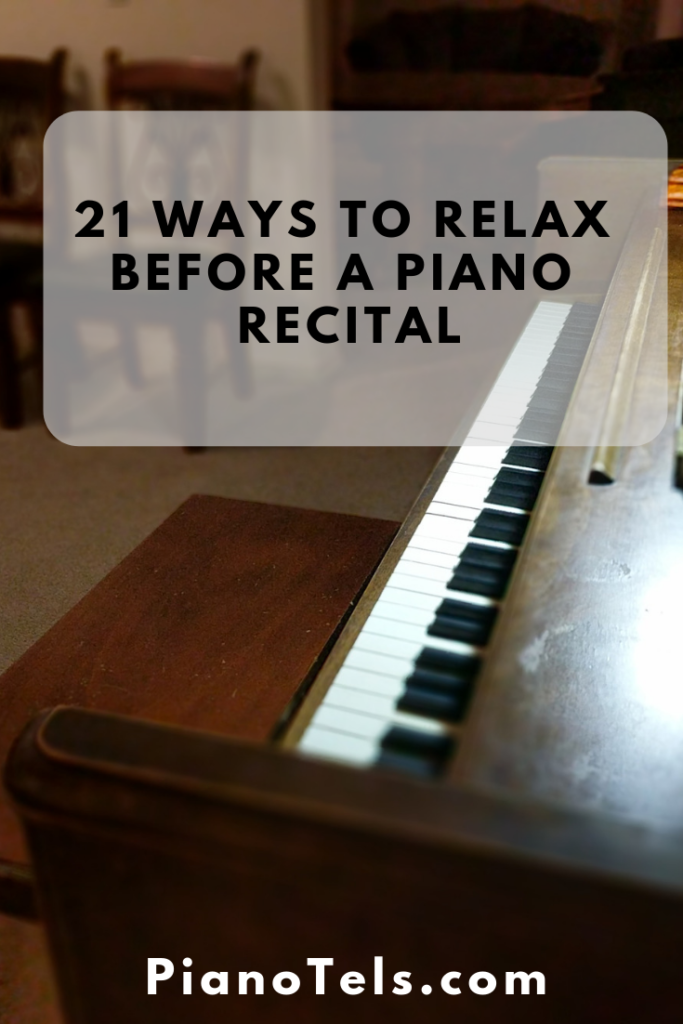Getting in front of an audience can make anybody anxious. My students always get nervous before their recitals, so I tried out these techniques before our recital last night. I was amazed to see that not only did it help the students relax and play at their best, it also became one of the most fun recitals we have ever had! They enjoyed the recital because their nervousness wasn’t in the way of them performing at their best.
Anxiety in and of itself actually can improve your performance, but don’t let it get to the point of inhibiting you. Try out some of these proven ways to help your nerves before a performance and see what works best for you.

1. Practice till you know it completely.
Knowing your piece thoroughly will do more for eliminating stage fright then just about anything you can do. When you are confident you can play your piece no matter what, then you won’t be nearly as anxious as when you feel there is room for error. If you have practiced your piece as much as you should have, rest assured that you will perform beautifully.
2. Visualize.
Imagine in your mind exactly what will happen. Imagine as many of the details as possible — what it will smell like, look like, and feel like. Imagine yourself successfully performing exactly as you would wish and believe that it really can happen exactly like that.
Your brain is an amazing thing and when you can visualize what you desire in a way that you actually believe will happen, it almost always does.
3. Breathe.
Focus your whole energy on breathing. Breathe in for 3 seconds, out for 5 seconds. This will cause you to focus your brain on just that one thing and calm your hear rate as well as refocus your brain on one thing — the performance.
4. Do something you enjoy before the performance.
The day of your performance is NOT the day to be practicing all day long. Your practice should have occurred a lot sooner and the day of the recital, practice your songs minimally. So, instead of increasing the tension all day through practice and worry, go do something you enjoy! You will be in great spirits by the time you show up for your recital as you will be having a wonderfully calm and enjoyable day already.
5. Exercise.
Science has countless research on how exercise decreases anxiety. Maintaining a healthy amount of exercise will help you to not have as increased anxiety during performances. The day of the performance, don’t forget to include a healthy exercise routine to help sharpen your focus and get you ready.
6. Bring a comfort item in your pocket.
Having something you can touch in your pocket can calm your nerves. It can be something warm such as a hand warmer. Warm hands perform better and provide comfort and calm. It can something soft that you can touch. It can be a lucky item that you have, or another item that represents support, comfort, and hope.
7. Avoid sugar.
High sugar foods can increase the heart rate and increase your anxiety. The day of the performance, eat healthy foods that will feed your brain and give you the real power you need to perform at your best. Avoiding sugar will help you to avoid the short term high and lows that come when the sugar hits the bloodstream.
8. Prepare.
Nothing increases stress levels like running around at the last minute trying to pull everything together. Make sure you are prepared for the performance with your clothing laid out and all the items that you need already assembled and ready to go. Plan your whole day to be stress free by not overscheduling your day.
9. Be comfortable.
Choose your clothing wisely. You want clothes and shoes that won’t distract you during the performance. You will also want to be confident you look your best though, so plan for comfort and style.
10. Break the tension.
If you are feeling your nerves begin to rise, then do something to break the tension. Smile, joke around with a friend, look for something comical that you can laugh about to yourself. Give yourself a reason to smile and you will automatically find yourself relaxing.
11. Be positive.
Always think and say positive thoughts. Don’t allow your mind to wonder what could go wrong, or what kinds of negative things other may be thinking about you. Just stay on the bright side, confident you will do your best, and remind yourself that this is fun. Also, smiling at the audience never hurts. Give it a try.
12. Be grateful.
Gratitude is an amazing emotion that is healing, calming, and stress reducing. A grateful mentality gives you the opposite of a scarcity mindset. A scarcity mindset shrinks the brain and omits the ability to be as ready to take in the stimuli that will inevitably occur during the performance. Thus, just start listing in your mind all the things that you are grateful for and focus on that before you hop on stage.
13. Use your anxiety.
Performers do better under a little anxiety. The nervousness allows for the adrenaline to run in your body and makes it so that your brain can work more efficiently. So if you are nervous, that’s awesome! Convert that nervousness into excitement and energy. Use it to really focus on your performance and make it the best you can!
14. Roll a tennis ball around on your feet.
Your feet are full of nerves and pressure points throughout your entire body. If you are able, take a tennis ball and roll it around on the bottom of your feet. Your pressure points will be stimulated and cause relaxing throughout your entire body as you do this. Especially focus on sensitive areas of your foot as those are the places that need it the most and will relieve the most tension as you work that out with your tennis ball.
15. Stay hydrated.
Your brain works at its best when it is well hydrated. The days before you perform, make sure that you are drinking plenty of liquids. The brain will be functioning at its best by the time of the performance. Keep a water bottle close by and take small sips here and there to make sure that you aren’t starving your brain.
16. Get a good night’s sleep.
Your body will work its best when you have treated it right! The last thing you want is a over-tired brain trying to perform in front of an audience and remember its music! Any stress on your body will increase stress to the brain. So do yourself a favor and get a nice good night’s sleep the night before to make sure you are awake, alert, and ready to shine!
17. Know how to recover from mistakes.
A live performance is nothing like a recording that can be meticulously looked through and tweaked till it becomes perfect. So plan on how to recover from your mistakes. Learn how to make sure the audience never realizes you messed up. Never react to your mistake. Never quit playing. If one hand loses it, continue with the other or do a quick improv recovery.
Continue forward until you recover your mistake. Play slightly faster and louder and the brain has a chance to recover the lost information. Planning out what you will do in case of a mistake will help you to be okay with a mistake if it does happen.
The audience doesn’t care what you just did, they care what you’re doing right now. — Tarun
If a mistake occurs, then forget it and move on. Give the audience a reason to focus on what you are now going to do. Don’t dwell on any past mistakes. Forget it immediately and move forward as if it never occurred, and the audience will forget it too!
18. Focus on the music.
Get lost in the music. Forget about yourself, forget about the audience. Lose yourself in the music and what you are creating under your fingers. Focusing on the music will cause you to forget everything else — including the anxiety or fear about what others may think about you. Anxiety is about you. So give that up and just dive in to the music for the sake of the music and live in it. The anxiety will disappear and you won’t even realize it.
Making music should be your primary concern, not escaping mistakes. — Félix Gagnon-Grenier
19. The more you do it, the less nervous you will be.
The more you have the opportunity to perform, the less nervous you will be over time. It will become more routine and your body and brain will become accustomed to the feel of performing and how to cope with it well. You will learn what works for you to help you perform your best. So give yourself a lot of opportunities to perform. Look for as many ways as you can to master this skill.
20. Don’t practice 2 hours before.
Your practice should have all been earlier. The day of, do NOT practice at least 2 hours before the performance. Your brain will not function as well and your best performance will not occur unless you quit practicing for a couple hours before the recital. Ideally, the day of the recital, only practice a piece at normal speed once, then once more slowly. Then no more at all. This technique comes from Chaun C. Chang’s Fundamentals of Piano Practice.
21. Remember that you are normal!
Being nervous is a very normal reaction to performing! Some of the greatest musicians we know had serious anxiety about performing. If you are anxious, you are in good company. Don’t stress out that you are the only one feeling this way. With a few coping skills, this anxiety will not overthrow your performance.
Most importantly: HAVE FUN!
You worked hard, practiced, learned from your mistakes, and your doing it no matter what. So might as well have fun with it! People enjoy a live performance for a reason. Because it is real, it isn’t always perfect, but you get the real person with the real music and that is something that can never be replaced! Enjoy the audience and let them enjoy you! The more you enjoy it, the more they will.
Resources:
- https://music.stackexchange.com/questions/31045/tips-for-how-to-stay-calm-before-a-concert
- https://takelessons.com/blog/piano-recital-stage-fright
- https://www.cooperpiano.com/top-10-tips-to-overcome-stage-fear-before-your-piano-recital/
Tel loves her life as a piano player, a piano teacher, and a mom. Amid piano blogging, piano teaching, and piano playing, she loves a chance to fit in a good exercise class, volunteer at her kids’ school and at her church, and go on long dates with her husband. Full bio at About Tel.



Excellent article, its so well explained.
This will help all the performers, thank you so much
Srikanth
Pianist
Music 360